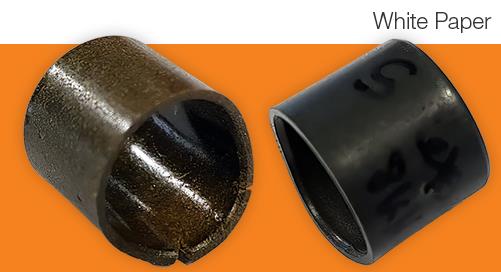How do self-lubricating bearings work?
Original article appeared on https://blog.igus.co.uk/how-do-self-lubricating-bearings-work/
If you know of igus® as a company, you will know that our entire company journey has been based on offering self-lubricating products. This was the initial concept over 60 years ago, this notion has not faltered and remains our key focus, offering solutions without lubrication. But what do we know about how self-lubricating bearings work?
What are self-lubricating bearings and how do they work?
Self-lubricating bearings, also known as maintenance-free bearings, are engineered to operate without the need for external lubrication. Unlike traditional bearings that rely on grease or oil, these innovative bearings come with built-in lubrication. But how do they achieve this?

Here’s how they work:
- Embedded Lubricants: picture a bearing with a special sliding layer. Within this layer lies an infused lubricant—either liquid (such as oil) or solid (like graphite or molybdenum disulfide). The choice of lubricant depends on factors like operating temperature and load.
- Gradual Release: as the bearing operates, the lubricant is gradually released through tiny pores in the sliding layer. Think of it as a controlled diffusion process. This consistent release ensures that the bearing surface remains well-lubricated even as wear occurs.
- Running-in Surface: at the top of the sliding layer, you’ll find a “running-in” surface. During startup, this surface provides low-friction performance until the embedded lubricant reaches the main bearing surface. It’s like a gentle introduction before the full lubrication kicks in.
Why are self-lubricating bearings better than ones that require lubrication?
Self-lubricating bearings offer several advantages over traditional bearings that require lubrication:
- Cost-Effective: Since these bearings have lubrication built into them, they generally don’t require much additional maintenance or upkeep and require no additional lubrication or oiling. This eliminates the labor costs surrounding repairs, upkeep and the cost of replacing parts.
- Increased Efficiency: In these bearings, lubrication is constant, causing reduced friction and wear. Self-lubricating bearings can work smoothly and efficiently with little to no maintenance, increasing productivity and reducing downtime. Because these bearings allow machines to work more smoothly, there is less energy consumption associated with them, reducing energy costs.
- Reduced Downtime: With no need for additional lubrication and their inherent lubrication abilities, these bearings are much less likely to fail due to friction or inadequate lubrication. The machines that self-lubricating bearings are integrated into can also operate much longer without unexpected failures causing costly downtime.
- More Environmentally Friendly: Traditional oils and lubricants are not needed in self-lubricating bearings in any way, meaning the waste they produce and the harmful effects they have on the environment are eliminated completely.
Related: 6 Lesser-Known Benefits of Engineered Plastic Bearings

Industries that commonly use self-lubrication
Self-lubricating bearings are essential in various industries, which is why igus® bearings are predominantly used.
Below are a few industries that use igus® self-lubricating bearings and why:
- Aerospace: Imagine a spacecraft hurtling through the cosmos. In this harsh environment, regular maintenance is impractical. Enter self-lubricating bearings. They keep satellite components functioning smoothly without astronauts having to grease them up in zero gravity.
- Industrial Machinery: In factories and manufacturing plants, machinery operates tirelessly. Self-lubricating bearings reduce downtime by eliminating the need for frequent lubrication checks. Whether it’s conveyor belts, robotic arms or heavy-duty presses, these bearings keep production lines humming.
- Automotive: Self-lubricating bearings contribute to ensuring your car drives smoothly and you remain in comfort. From wheel hubs to suspension systems, they enhance durability and reduce maintenance hassles. Plus, they handle extreme temperatures and road conditions with ease.
- Medical Devices: Precision matters in medical equipment. Self-lubricating bearings find their place in surgical robots, MRI machines and prosthetic limbs. Their silent operation and reliability are critical for patient care.
A lubrication-free future
As technology advances, self-lubricating bearings will continue to evolve. Researchers worldwide will continue to explore new materials, improved lubricants and enhanced designs. And this is no different for igus®. We continue to invest in more advanced technology and testing equipment and strive to improve our materials year on year.
These unassuming yet indispensable components have so many useful benefits, as highlighted within this blog. So next time you encounter a smoothly rotating wheel, a quietly humming conveyor or a precision instrument, remember the unsung heroes—the self-lubricating bearings—that keep our world moving quietly, efficiently and without lubrication. For more blogs on igus® bearings read them here.



